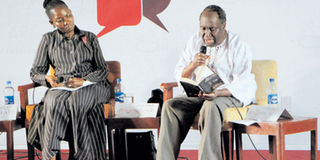Ngugi could do a lot more to promote Kiswahili in Kenya

Molara Wood listens in as Ngugi wa Thiong’o reads an excerpt from his book, Detained: A Prison Writer’s Diary, during the Ake Arts and Literature festival held in Abeokuta, Nigeria. PHOTO| ANNE MUCHEKE
What you need to know:
- True to his word, since the late 1980 or thereabouts, Ngugi has been writing most of his creative works in Gikuyu and later getting the works translated into English by himself or being translated into Kiswahili buy other people.
- His novel, Murogi wa Kagoogo (Wizard of the Craw), for example was first written in Gikuyu before Ngugi himself translated it into English.
Among great scholars and writers in Africa who have over time advocated for the recognition and deliberate development of our local languages are Ngugi wa Thiong’o, Grace Ogot, Professors Okoth Okombo, Mohamed Hassan Abdulaziz, Wole Soyinka, Chinua Achebe, Kimani Njogu, Chacha Nyaigotti Chacha and Karega Mutahi.
Ngugi wa Thiongo and Grace Ogot, for example, did take an extra step of writing in their native tongues — Ngugi writing in Gikuyu while the late Grace Ogot penned many creative works in Dholuo.
In his collection of essays Decolonizing the Mind: The Politics of Language in African Literature, Ngugi wa Thiong’o states: “This book, Decolonizing the Mind, is my farewell to English as a vehicle for any of my writings. From now on, it is Gikuyu and Kiswahili all the way.”
True to his word, since the late 1980 or thereabouts, Ngugi has been writing most of his creative works in Gikuyu and later getting the works translated into English by himself or being translated into Kiswahili buy other people. His novel, Murogi wa Kagoogo (Wizard of the Craw), for example was first written in Gikuyu before Ngugi himself translated it into English. Ngugi’s earlier works such as The Devil on The Cross (Caitani Mutharabaini)Weep Not, Child, The Black Hermit and I Will Marry When I want were later translated into Kiswahili by other people as Shetani Msalabani (C. Kabugi), Usilie Mpenzi Wangu (J.N. Somba), Mtawa Mweusi and Nitaolewa Nikipenda respectively – thus contributing to translated Kiswahili literature.
Although Ngugi’s contribution to translated Kiswahili literature cannot be gainsaid, I strongly feel that Ngugi has not come out forcefully enough to develop Kiswahili deliberately by translating his Gikuyo works into Kiswahili himself. In the 1990s, New York University wanted to offer Ngugi wa Thiong’o a job. As Ali Mazrui argues, once an American University sets an eye on someone it seriously wants to give a job, the institution can do anything possible to meet the demands of the prospective scholar. One of the demands that Ngugi wa Thiong’o wanted met before accepting the offer was that the university publishes a journal in Gikuyu — Mutiiri.
Because the institution desperately wanted Ngugi’s services, it accepted his demands. Mazrui says that once Ngugi got the job and started publishing Mutiiri, he wrote to him (Mazrui) a letter (in Kiswahili) asking whether the library of the university where Mazrui was teaching could subscribe to copies of Mutiiri Journal. Prof Mazrui responded to Ngugi’s letter by informing him that Kikuyu readers in Mazrui’s university could be either very few or the figure was negligible. Prof Mazrui suggested to Ngugi that the journal could be more appealing if it was bi-lingual — Kikuyu and Kiswahili.
Prof Mazrui says that he felt that although there was an unfounded belief that sometimes Kiswahili stifles other local languages, that was a good opportunity for Kiswahili to help Gikuyu to prosper. Mazrui says that Ngugi never quite agreed with Mazrui’s suggestion. Although Ngugi has been at the forefront advancing the agenda of Gikuyu as a local language, I strongly feel that he has not advanced the agenda for Kiswahili with the rigour and vigour that he employs in drumming up support for Gikuyu. If it were so, he could not have turned down Prof Mazrui’s suggestion on the bilingualism of Mutiiri.
Why doesn’t Ngugi, for example, write his creative works in Kiswahili? Is Ngugi incapable of writing in Kiswahili? Is it sabotage or betrayal of Kiswahili? The only published article I know of which Ngugi ever wrote in Kiswahili was a review of Shafi Adam Shafi’s novel — Vuta N’kuvute — which was published in Taifa Leo sometime in 2008.
I therefore call upon Ngugi to live up to his promise in Declolonising the Mind: “From now on it is Gikuyu and Kiswahili all the way.” At what point did he renege on this statement? However, credit should be given where it is due. Ngugi’s efforts in defending and churning out creative works in his native Gikuyu language are commendable despite nothing creative in Kiswahili coming from his pen.
Enock Matundura, translator of Barbara Kimenye’s Moses series (Oxford University Press), teaches Kiswahili literature at Chuka University




